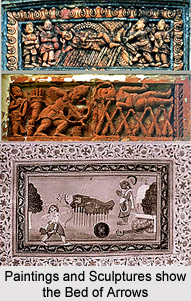 Bed of Arrows for Bhishma was made by the numerous arrows of Arjuna, who with the aid of Shikhandi, showered several arrows over his grandsire. Bhishma was struck down with mortal wounds by Arjuna on the tenth day of the war. After the ninth day, the war ended with the Pandavas alongwith their generals and Krishna sat in their camps to discuss their plans for the war. Since Bhishma was unvanquished the victory of the Pandavas seemed impossible till Bhishma leads the Kauravas in the battle. Thus, they sat together to discuss the way in which they could defeat Bhishma. While discussing, Yudhisthir realized that Bhishma had promised to him before the war that even if he was unable to fight in their side, however, he would be available to give them valuable counsel if they required at any point of time. Thus, Yudhisthir decided to visit the camp of the Kauravas along with his brothers and Krishna in order to meet their grandsire. There they came to know that Bhishma would not use weapons over someone who was a woman or someone who was born as a woman and the next day Arjuna took Shikhandi to the battlefield and thus Bhishma was showered with arrows by Arjuna while Shikhandi was kept in from of the Kaurava commander.
Bed of Arrows for Bhishma was made by the numerous arrows of Arjuna, who with the aid of Shikhandi, showered several arrows over his grandsire. Bhishma was struck down with mortal wounds by Arjuna on the tenth day of the war. After the ninth day, the war ended with the Pandavas alongwith their generals and Krishna sat in their camps to discuss their plans for the war. Since Bhishma was unvanquished the victory of the Pandavas seemed impossible till Bhishma leads the Kauravas in the battle. Thus, they sat together to discuss the way in which they could defeat Bhishma. While discussing, Yudhisthir realized that Bhishma had promised to him before the war that even if he was unable to fight in their side, however, he would be available to give them valuable counsel if they required at any point of time. Thus, Yudhisthir decided to visit the camp of the Kauravas along with his brothers and Krishna in order to meet their grandsire. There they came to know that Bhishma would not use weapons over someone who was a woman or someone who was born as a woman and the next day Arjuna took Shikhandi to the battlefield and thus Bhishma was showered with arrows by Arjuna while Shikhandi was kept in from of the Kaurava commander.
After the ninth day of battle at Kurukshetra ended with the setting sun, the Pandavas decided to visit the camp of Bhishma in order to ask him the way in which he would be slain. Thus, Yudhisthir asked him the exact way in which they could overcome him. Then Bhishma told that there were certain persons in the world against whom he would not like to use arms. He would not use arms against an unarmed person, against the vulgar, or against a woman or one who was born as a woman. If anyone was covered by anyone of those mentioned by him, then he could easily kill him. However, he warned them that the arrows should be shot at him from the hands of Lord Krishna or Arjuna by which he would consent to die.
The Pandavas were, thus, delighted to know the secret of the death of Bhishma and the next day Arjuna was accompanied by Shikhandi who was born as a woman and attained perfect manhood later. As per legends, Shikhandi was blessed in his previous life by Lord Shiva that she would be born as a woman and then would become a man and would ultimately be the cause of death of the great warrior Bhishma. When Bhishma saw Shikhandi, he withdrew his weapons and Shikhandi started to shower arrows over the Kuru general. Bhishma never responded to the arrows and never replied to the arrows of Shikhandi. Seeing the fate of Bhishma, Arjuna also started to shower several arrows over his grandsire and in a moment the Kuru general fumbled and fell over the ground. However, his body never touched the ground for the numerous arrows of Arjuna which pierced the body of Bhishma, created a bed of arrows for him on which he slept.
Lying on the bed of arrows, Bhisma asked for a pillow to keep his head. All kinds of soft and beautiful pillows were brought for Bhishma, but he waved them aside as not fit for the bed of a hero, and turned to Arjuna. Then Arjuna, stringing the Gandiva or the bow, shot three arrows into the earth for the support of Bhishma`s head. Thus, the son of Santanu and Ganga slept over the bed of arrows formed by Arjuna in the battlefield.



















